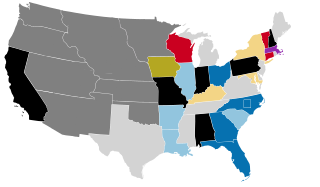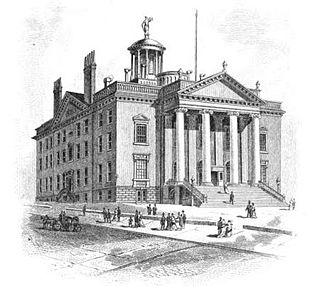
William Christian Bouck was an American politician from New York. He was the 13th Governor of New York, from 1843 to 1844.
New York is a Democratic stronghold and is considered one of the "Big Three" Democratic strongholds alongside California and Illinois. The following table indicates the party of elected officials in the U.S. state of New York:
The Commission to Explore a Route for a Canal to Lake Erie and Report, known as the Erie Canal Commission, was a body created by the New York State Legislature in 1810 to plan the Erie Canal. In 1817 a Canal Fund led by Commissioners of the Canal Fund was established to oversee the funding of construction of the canal. In 1826 a Canal Board, of which both the planning commissioners and the Canal Fund commissioners were members, was created to take control of the operational canal. The term "Canal Commission" was at times applied to any of these bodies. Afterwards the canal commissioners were minor state cabinet officers responsible for the maintenance and improvements of the state's canals.

The 1858 New York state election was held on November 2, 1858, to elect the governor, the lieutenant governor, a Canal Commissioner, and an Inspector of State Prisons, as well as all members of the New York State Assembly and two members of the New York State Senate. Besides, the question was asked if a Constitutional Convention should be held, and answered in the negative: The vote was 135,266 for and 144,526 against.

The 1862 New York state election was held on November 4, 1862, to elect the governor, the lieutenant governor, a Canal Commissioner, an Inspector of State Prisons and the Clerk of the Court of Appeals, as well as all members of the New York State Assembly.

The 1874 New York state election was held on November 3, 1874, to elect the governor, the lieutenant governor, a judge of the New York Court of Appeals, a Canal Commissioner and an Inspector of State Prisons, as well as all members of the New York State Assembly and one member of the New York State Senate.

The 1846 New York state election was held on November 3, 1846, to elect the governor, the lieutenant governor and two Canal Commissioners, as well as all members of the New York State Assembly and eight members of the New York State Senate.

The 1847 New York state election was held on November 2, 1847, to elect the lieutenant governor, the secretary state, the state comptroller, the attorney general, the state treasurer, the state engineer, three Canal Commissioners and three Inspectors of State Prisons, as well as all members of the New York State Assembly and the New York State Senate.

The 1849 New York state election was held on November 6, 1849, to elect the Secretary of State, the State Comptroller, the Attorney General, the State Treasurer, the State Engineer, a Judge of the New York Court of Appeals, a Canal Commissioner and an Inspector of State Prisons, as well as all members of the New York State Assembly and the New York State Senate.

The 1855 New York state election was held on November 6, 1855, to elect the Secretary of State, the State Comptroller, the Attorney General, the State Treasurer, the State Engineer, two judges of the New York Court of Appeals, a Canal Commissioner and an Inspector of State Prisons, as well as members of the New York State Assembly and the New York State Senate.

The 1839—1840 United States Senate election in New York was held on February 5, 1839 and January 14, 1840. Incumbent Senator Nathaniel P. Tallmadge was re-elected to a second term in office over scattered opposition.

The 1845 United States Senate special election in New York was held on January 18, 1845 by the New York State Legislature to elect two U.S. Senators to represent the State of New York in the United States Senate. The regular 1845 United States Senate election in New York was held on February 4, 1845, to elect a U.S. Senator to represent the State of New York in the United States Senate.

The 1855 United States Senate election in New York was held on February 6, 1855, by the New York State Legislature to elect a U.S. Senator to represent the State of New York in the United States Senate.

The 1857 United States Senate election in New York was held on February 3, 1857, by the New York State Legislature. Incumbent Whig Senator Hamilton Fish did not stand for re-election. The seat was won by Preston King, a former U.S. Representative and member of the newly formed Republican Party. King was the first Republican elected to represent New York, although William H. Seward had joined the party after being elected as a Whig in 1855.

The 1850–51 United States Senate elections were held on various dates in various states. As these U.S. Senate elections were prior to the ratification of the Seventeenth Amendment in 1913, senators were chosen by state legislatures. Senators were elected over a wide range of time throughout 1850 and 1851, and a seat may have been filled months late or remained vacant due to legislative deadlock. In these elections, terms were up for the senators in Class 1.

The 1858–59 United States Senate elections were held on various dates in various states. As these U.S. Senate elections were prior to the ratification of the Seventeenth Amendment in 1913, senators were chosen by state legislatures. Senators were elected over a wide range of time throughout 1858 and 1859, and a seat may have been filled months late or remained vacant due to legislative deadlock. In these elections, terms were up for the senators in Class 2.

The 1856–57 United States Senate elections were held on various dates in various states. As these U.S. Senate elections were prior to the ratification of the Seventeenth Amendment in 1913, senators were chosen by state legislatures. Senators were elected over a wide range of time throughout 1856 and 1857, and a seat may have been filled months late or remained vacant due to legislative deadlock. In these elections, terms were up for the senators in Class 1.

The 1854–55 United States Senate elections were held on various dates in various states. As these U.S. Senate elections were prior to the ratification of the Seventeenth Amendment in 1913, senators were chosen by state legislatures. Senators were elected over a wide range of time throughout 1854 and 1855, and a seat may have been filled months late or remained vacant due to legislative deadlock. In these elections, terms were up for the senators in Class 3.

The 67th New York State Legislature, consisting of the New York State Senate and the New York State Assembly, met from January 2 to May 7, 1844, during the second year of William C. Bouck's governorship, in Albany.

The 68th New York State Legislature, consisting of the New York State Senate and the New York State Assembly, met from January 7 to May 14, 1845, during the first year of Silas Wright's governorship, in Albany.














